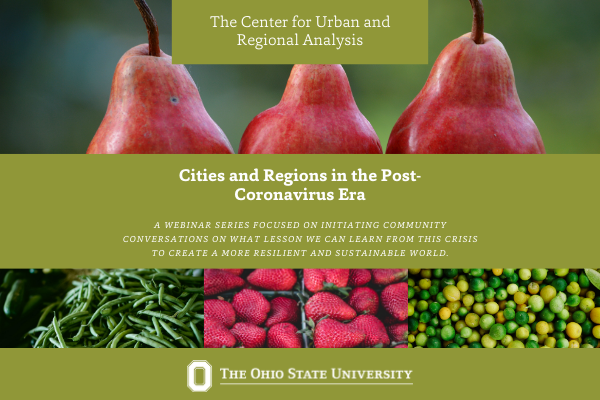
The Impacts of COVID-19 on Food Security and Long-term Implications and Adaptations will be the fifth in a series of events on “Cities and Regions in the Post-Coronavirus Era,” initiating community conversations on what lessons we can learn from this crisis to create a more resilient and sustainable world.
What are the Impacts of COVID-19 on Food Security? What are the long-term implications? How can we learn from this crisis and find new adaptations to make our communities more food resilient and secure?
Moderated by Harvey Miller
Tune into our webinar to hear the perspectives of our panelists!
Our panelists include:
- Kip Curtis - Associate Professor in the Department of History
- Under the banner of Ecology and Social Justice, Dr. Curtis is the Principal Investigator in a community-led food system intervention project in Mansfield, Ohio. In 2016, Dr. Curtis designed a whole-system approach to urban agriculture development and in 2018 he leveraged community-University partnerships into a $2 million pilot project now underway in Mansfield to develop that system. In addition to coordinating development for the initiation of an urban microfarm production system for the small city, Dr. Curtis has developed, constructed, and is working with students and alumni to grow food on a demonstration urban microfarm built atop a former parking lot on the Ohio State Mansfield campus. This model small-plot, high-yield microfarm currently produces food for the campus cafeteria, the campus community, and for Richland Gro-Op cooperative.
- Mary Rodriguez - Assistant Professor in the Department of Agricultural Communication, Education, and Leadership at OSU
- As an assistant professor of Community Leadership, Mary Rodriguez works in addressing household food insecurity. She approaches her research by examining the role of women in the household and explores the interaction between the community social system and individual's decision making. Mary works mostly in developing nations and with low SES, low income populations stateside.
- Brian Snyder - Executive Director of InFACT
- Brian Snyder is executive director of the Initiative for Food and AgriCultural Transformation (InFACT) at The Ohio State University. InFACT is a transdisciplinary program aimed at designing and implementing food systems that are sustainable, defined as achieving a balance of ecology, economy, technology and culture to promote the overall well-being of people, animals and the natural environment. Previously, Brian served as executive director of the Pennsylvania Association for Sustainable Agriculture (PASA), one of the leading sustainable agriculture organizations in the nation, and The William J. Gould Associates, which operates Gould Farm, a 700-acre sustainable farm and mental health treatment facility in Western Massachusetts. He currently sits on the advisory board of the Resnick Center for Food Law and Policy at UCLA School of Law, and served for two years in the past as president of the Pennsylvania State Council of Farm Organizations.
- Lauren Vargo – Program Manager at Case Western Reserve University
- Lauren Vargo is a Research Assistant with the Ohio Produce Perks Statewide Evaluation at the Swetland Center for Environmental Health at Case Western Reserve University. She also works on the FreshLink Ambassador Project housed in the Prevention Research Center for Healthy Neighborhoods. Previously, Lauren was the Produce Perks Program Coordinator at The Ohio State University Extension in Cuyahoga County and has worked with farmers’ markets, local food access, and SNAP incentive programs in Cleveland for several years.
Click the link below to register!
If you require an accommodation such as live captioning or interpretation to participate in this event, please contact Katie Phillips at phillips.1870@osu.edu or 614-688-4914. Requests made 10 day prior to the event will generally allow us to provide seamless access, but the university will make every effort to
meet requests made after this date.
